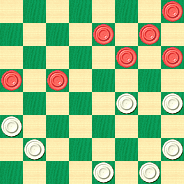The Checker Maven
Jump to navigationA Dishpan Move

We've heard various names given to a losing move in a checker match; these epithets range from the rather mild "unfortunate" to the somewhat stronger "poor" and on up from there to other things that we certainly won't print here.
In the following game, played in the early 1930s between very strong players, such a move was made. When the game was published, the losing choice was called a "dishpan" move, a term which we hadn't heard before. It's an amusing and appropriate choice of words. Let's have a look at the game in question.
9-13 24-20 5-9 22-18 10-15---A 25-22 6-10 27-24---B 10-14 22-17 13x22 26x10 7x14---C 30-26 15x22 26x10 2-7 10-6 1x10 29-25 10-15 23-19 9-13 19x10 7x14 24-19 3-7---D
A---10-14 is often played instead; there is little difference.
B---28-24 is just as good.
C---15-22 same.
D---It was textbook play up to this point. The original editor called this a "hasty dishpan move" noting that the player "must have eaten too much for dinner."

WHITE
White to Play and Win
W:W32,31,28,25,21,20,19:B14,13,12,11,8,7,4.
Will this one wash, or will this position "sink" you? Find the win for White, and while you're at it, correct Black's losing "dishpan" move. When you're done, clicking on Read More will bring you cleanly to the solution.![]()
Solution
14-18 instead of 3-7 would have drawn. White now wins as follows:
32-27* 7-10 25-22 (or 27-23) 11-16 20x11 8x24 28x19 4-8 27-23 8-11 22-18 White Wins.
Watch out for those big dinners prior to an important match!

You can email the Webmaster with comments on this article.
